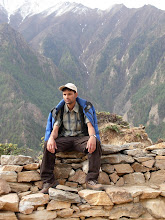People in the remote district of Mustang have been experiencing the worst nightmares in terms of the effects of climate change in their livelihoods and economy.
This year, the Jomsom valley saw no snowfall in the town area and no rainfall at all. The maximum temperature rose to 27 degree Celsius in comparison to 24 degrees last year. Similarly, the minimum temperature was recorded at 13 degrees, whereas in previous years, the temperature usually dipped to less than minus four degrees. The temperature fluctuation has also had an adverse effect on the snow fall pattern.
Alarmingly, the snow-line has gradually been moving up to an altitude of 5,000 meters, thereby leaving mountain rocks bare. Since snow is melting fast, tree lines are moving up as well.
According to the locals, the snow has started melting “very quickly” in Upper-Mustang. All the VDCs are now facing acute shortage of water due to quick evaporation as sources of water have drastically dried up in just a years´ time.
“This year we saw no snow here, whereas it used to snow four times a year earlier,” BP Sharma, a local shopkeeper told myrepublica.com, adding, “We have had no rainfall this year. There used to be plenty of rainfall until two years back.”
Worst affected is horticulture, which is on the verge of extinction. “In Kunjo and Kobang, there is no apple farming at all now,” said Paras Bahadur Singh, the conservation officer of Annapurna Conservation Area Project (ACAP). He informed that in Kunjo the locals are now considering orange farming as an option and in Kobang people are opting for walnut farming.
Since there is hardly any rainfall, fertile lands have turned barren. This has also had an adverse effect on the livestock. People seem to have noticed the drastic change in bio-diversity and wildlife movement though. As per the locals, one can easily find jackals at an altitude of 3800 m, which was impossible until just a few years ago. Similarly, between the months of Baisakh to Ashwin, more house flies and mosquitoes are noticed.
Mustang has a population of 14,000, and is now considered one of the most vulnerable places under the threat of glacier lake outburst. Experts have said that Thulagi glacier lake in northern Manang, which now has a high glacier deposit, is the biggest danger facing the region.
“If Thulagi bursts, the Bhotekoshi experience will repeat,” Ngamindra Dahal, a climate change expert told myrepublica.com. He added that the burst will lead to rise in the water-level of Marsyangdi, which will sweep off major hydro projects in Nepal. The Gandak barrage will be hit the hardest.



No comments:
Post a Comment